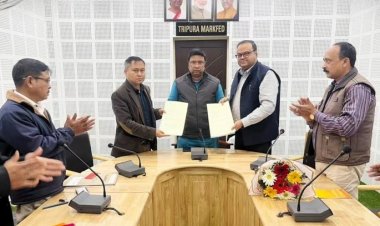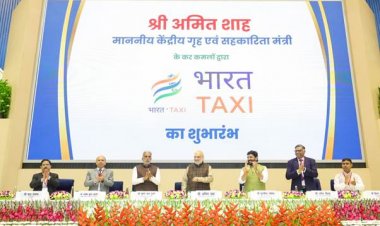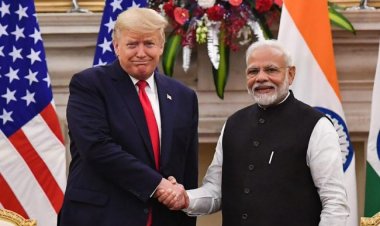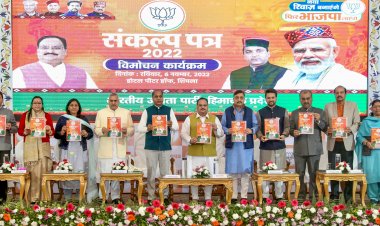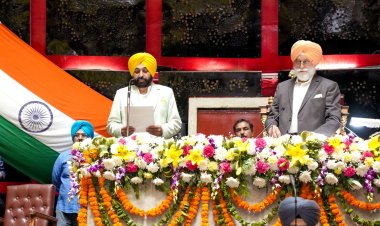Rural Voice Dialogue: Governance in cooperatives major issue; suggestion for elections to be conducted by EC
Emphasizing transparency in the election procedure of cooperative societies, Dr Uday Joshi, National General Secretary, Sahakar Bharati, said that the elections could be entrusted to the Election Commission (EC). This will reduce the disputes pertaining to elections in these institutions and also bring transparency.
If the responsibility to conduct elections in cooperatives is handed over to the Election Commission (EC), it will not only reduce the disputes regarding the election procedure but also bring transparency to the functioning of cooperatives. This was a major suggestion in the Dialogue on “Sahakar se Samriddhi: Many pathways” presented by Rural Voice, a media house that focuses on agriculture and rural affairs, in association with Sahakar Bharati on Wednesday.
The aim of the Dialogue was to identify the challenges that the cooperative movement faces and explore new possibilities to take the movement forward. Several eminent personalities participated in the Dialogue. You may watch the entire first session by clicking on the video link given above.
Technology will bring transparency: Siraj Hussain
Opening the first session on “Strengthening cooperatives for better income realization”, former Agriculture Secretary Siraj Hussain said that the formation of the new Ministry of Cooperation was a good step and the Ministry should aim at bringing transparency to the functioning of cooperatives. He suggested that technology should be used in cooperatives as much as possible. This will make their functioning transparent. Hussain said that while all the Primary Agricultural Credit Societies (PACS) had been computerized in Telangana, this was not the case in Uttar Pradesh (UP) as yet. He said that if there was any sort of muddle in a cooperative, technology would soon bring this to light. He said that only a comprehensive discussion would result in a better policy.
According to the former Agriculture Secretary, the government should not directly regulate the cooperatives, or else this will give rise to tension. The government should regulate these institutions in such a manner that its members are not harmed. As the size of the cooperative grows, its financial power also increases, said Hussain. Subsequently, people vie for the control of the institution.
Hussain said that the influence of cooperatives has waned over the past two decades. For example, the share of dairy cooperatives is constantly reducing in Uttar Pradesh (UP). Hussain welcomed the decision to allow cooperatives to register as “buyers” on the public procurement portal GeM (Government e-Marketplace) and said that this would bring transparency.
Farmers should get higher prices and reduce costs: Jayen Mehta
Jayen Mehta, COO, GCMMF, Amul, said that in order to increase the farmers’ incomes, it was necessary that they got higher prices for their produce and minimized the costs. This is the model on which Amul works. Talking about the prospects of dairy cooperatives in India, he said that at present 22 per cent of the world’s milk was produced by India. This would go up to 35 per cent in a decade. Of the incremental production in the next 10 years, India’s share will be two-third. Mehta said that cooperatives could play a significant role in increasing the farmers’ productivity and in reducing their costs.
He said that farmers got 85 per cent of the milk prices that Amul obtained from its consumers. Speaking about Amul’s achievements, he said that about 36 lakh farmers are associated with the cooperative. Any farmer can easily become a member. The annual turnover of Amul has gone up to Rs 61,000 crore.
Credit cooperatives should get insurance coverage: Dr Uday Joshi
Speaking about the necessity of reforms in cooperatives, Dr Uday Joshi, National General Secretary, Sahakar Bharati, said that people had been talking about their dirty image for long. Earlier, too, it has been said that cooperation has failed, but it must succeed. Despite the Supreme Court having struck down the operational part of the 97th Amendment, it still holds good that making cooperatives is a fundamental right. The country has more than 95,000 Primary Agricultural Credit Societies (PACS). Some of them are not functional but a majority of them are functioning smoothly. Dr Joshi said that the members of the cooperatives should work with the feeling of trusteeship. In view of the employment potential of the cooperatives, it is necessary to improve their image.
Dr Joshi spoke about the necessity of ease of doing business for changing people’s attitude towards cooperatives. He said that a lot of time was wasted going to the Registrar again and again to seek his approval. Emphasizing transparency in the election procedure of cooperative societies, he said that the elections could be entrusted to the Election Commission (EC). This will reduce the disputes pertaining to elections to these institutions.
Since the formation of the new ministry, there have come several suggestions to amend the cooperative laws, said Dr Joshi. Sahakar Bharati, however, believes that a national policy should be formulated first and amendments should be made only on its basis. This would obviate the necessity of repeated amendments. Dr Joshi said that cooperatives did not attract the required capital investment. The need is to explore the fundraising routes of bonds, debentures, preferential shares, etc. Dr Joshi said that PACS had the facility of deposit mobilization. If this facility is increased further, the PACS will work still better.
Dr Joshi spoke about the necessity of deposit insurance coverage for all credit societies. Credit societies have to handle a lot of cash, so they should get membership in national payment systems. This will also promote cashless transactions. Dr Joshi said that PACS may also serve as FPOs (Farmer Producer Organizations) in rural areas. Rules will have to be somewhat amended for this purpose. It is necessary to strengthen the PACS to make India a $5trn economy.
NCUI has failed to play its role: Ajay Vir Jakhar
Ajay Vir Jakhar, Chairman, Bharat Krishak Samaj, said that it was necessary to train the people associated with cooperatives. He said that NCUI had been formed with this purpose but its work in this field could not be called satisfactory. Most of the officials are simply ignorant of the cooperative laws. There is no transparency at the officer level. These conditions need to be changed. Jakhar said that most of the cooperatives did not want to share their profit with NCUI.
Jakhar said that in order to ensure the success of cooperatives, it was also necessary to understand the reasons why cooperatives had failed. He said that a report had come in 1965 with regard to reforms in cooperatives. And the issues that it had raised are still there even today.
Cooperatives cannot function without support from the government, said Jakhar. But along with government support, there is also an increase in government interference. It is this increase of interference in the functioning of cooperatives that led to the formation of FPOs. But the rules for the FPOs have their own share of problems. And this is so because the rules have been made on the advice of foreign consultancies, who know little about the ground reality.
Jakhar said that cooperative banks needed to increase their scale. They could not become competitive without this. In order to achieve this, he suggested merging district cooperative banks with state-level ones. However, he disagreed with Dr Joshi’s suggestion of issuing shares and debentures to raise capital. Jakhar also said that the dysfunctional cooperatives should be debarred from the election process.



 Join the RuralVoice whatsapp group
Join the RuralVoice whatsapp group

















